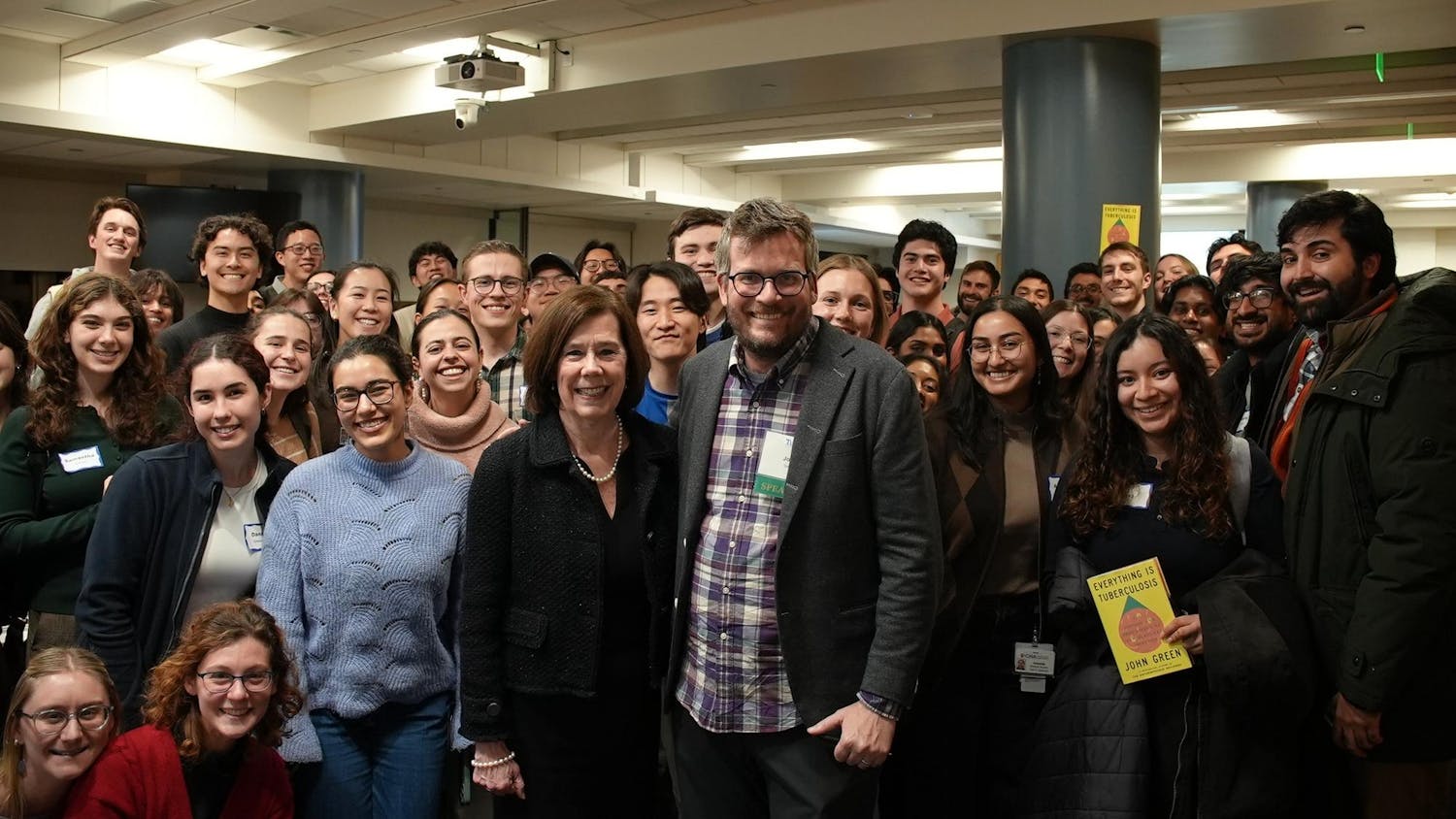Editor's note: This is the first part of a two-part series about how the Tufts and Medford/Somerville communities have rallied in support of undocumented immigrants and students.
The United States has always had a complicated relationship with immigration. Most recently, President Trump’s executive orders on immigration, from the travel ban to his crackdown on immigrants of undocumented status, have garnered increased national media attention.
This issue has hit home on Tufts' campus, where a small yet united undocumented community resides. The past year has seen a student protest against the termination of the Deferred Action for Childhood Arrivals (DACA) program and statements from members of the administration in support of DACA, as well as an increasing number of events run by student groups and local organizations in support of students of undocumented status and students enrolled in DACA.
United for Immigrant Justice (UIJ) is an organization at Tufts that advocates for the rights of all immigrants, both at Tufts and regionally. According to UIJ member Alejandro, who did not provide his last name due to safety concerns, the organization works to represent a marginalized identity that many at Tufts and beyond are unable to relate to.
This past semester, UIJ has co-sponsored a number of events to increase dialogue around the immigrant experience and specifically the obstacles that persons of undocumented status face. In February, UIJ co-hosted the Tufts Japanese Culture Club’s (JCC*) Day of Remembrance event, in collaboration with the Asian American Center and the Consortium of Studies in Race, Colonialism, and Diaspora.
The event, titled "Day of Remembrance: Incarceration and Resistance," commemorated the signing of Executive Order 9066 by President Franklin D. Roosevelt on Feb. 19, 1942 -- which authorized the incarceration of Japanese-Americans -- and explored how Japanese-American incarceration during World War II affects the present day.
Senior Joseph Tsuboi was a panelist at the event. As a member of JCC*, Tsuboi has helped plan this event for the past four years. He said that it was his obligation to educate himself, members of JCC* and the greater Tufts community on the impact that incarceration of Japanese-Americans during World War II had on generations of Japanese-Americans.
Tsuboi explained that he had conversations with different members of UIJ, and while listening to their experiences, began to entertain the idea of a collaborative event between the two organizations that would emphasize the present difficulties that immigrants of undocumented status face on a daily basis.
While reflecting on the event, Tsuboi connected the experiences of Japanese-Americans during World War II to the modern immigrant experience while noting where the two groups diverge.
“What was most poignant for me during the event was that while our stories diverge in regards to race, gender and generation, … the Japanese-American incarceration ... [and the subsequent] trauma on generations after are not exactly the same as [the discrimination] that today’s immigrants experience. But what is very similar are the [unjust] policies [toward immigrants] in place that did not disappear from World War II,” he said.
Alejandro was another panelist at this event. He shared his appreciation for the opportunity to share his experiences as an undocumented immigrant with the broader Tufts community, adding that by working with other organizations, narratives of immigrants and students of undocumented status reach wider audiences.
“I participated in [Day of Remembrance] by [relating] the internment experience to our contemporary scapegoating of undocumented immigrants,” he said.
Tsuboi touched on the generational difference between the incarceration of Japanese-Americans and the mistreatment of people with undocumented status.
“Our stories are generations old. We think it is important to voice ours [and our families'] in order to develop our own identities now, but I think it is really scary if we look at how young the other panelists [from UIJ] are because it is more direct on their bodies and minds," Tsuboi said. "These issues that I want to bring up are even more hard on the other folks on the panel.”
According to Tsuboi, the concept of citizenship was manipulated by the American government for the second-generation of Japanese-Americans during the 1940s.
“The legal language that the government used to describe that generation is known as non-alien, so instead of saying ‘citizen,’ which would give them more agency, they actually called them first-generation aliens. Non-aliens was used to blur the lines … further from citizenship," he said.
Tsuboi also explained that his grandfather was one of thousands of “no-no boys," a group of Japanese-Americans who opted, on questions 27 and 28 of the loyalty questionnaire given at internment camps, not to join the U.S. military or renounce their loyalty to Japan and pledge their allegiance to the United States.
“It is the same government that is locking people up against their will, but there is also a lot of expectations to prove their Americanism and thus serve the army,” Tsuboi said. “[Renouncing their loyalty to Japan] has a lot of implications, because kids who knew that their parents did not have citizenship feared that their parents would not have rights after the war.”
Tsuboi pointed out that while many resisted, others followed the government’s orders because they thought it was the only way that they survive what was happening to them.
This event was the second collaborative event hosted by the JCC*. In 2017, JCC* co-hosted its Day of Remembrance event with the Muslim Students Association (MSA). This event touched on the rhetoric directed at Japanese-Americans during World War II, such as "alien," "enemy-alien" and "non-alien," and the use of language directed at Muslims post-9/11.
"Specific rhetoric constructs an ethnic group or a race as an enemy," Tsuboi said.
Tsuboi noted that such rhetoric language is something that both in the past and today affects all immigrants.
"History repeats itself, and it is my job and part of an obligation of knowing this history, and using it to propel thought and bringing forward that ... [all of these experiences] are connected," he said.
He cited these stories of his ancestors as part of his motivation to fight injustice in today’s America.
“I think it is on us as direct descendants of folks who have experienced this discrimination 75, 76 years ago to get behind contemporary issues. [This is] part of my motivation to get behind MSA and UIJ and their missions, because that collaboration is not something that goes on that often at Tufts," he said.
In March, UIJ co-sponsored a screening of the documentary "Clínica de Migrantes: Life, Liberty, and the Pursuit of Happiness" with The Welcome Project, the Department of Community Health, Health and Wellness, Office for Student Success and Advising and the Tufts Premedical Society. The screening was followed by a moderated discussion.
Senior Katherine Campbell, president of the Tufts Premedical Society, explained that the producers of the documentary reached out to them to see if Tufts would be interested in hosting a screening. According to Campbell, members of the Tufts Premedical Society executive board felt that this opportunity aligned well with contemporary discussions at Tufts and across the country.
On the panel at the documentary screening were Adolfo Cuevas, an assistant professor of community health, serving as moderator, Jessica Zeidman of the MGH Chelsea HealthCare Center, Ben Echevarría, executive director of The Welcome Project, and Tufts student Alejandro. In addition, there was a representative from The Family Van, a mobile van that, according to Campbell, provides medical assistance to underserved communities in the Boston area, specifically in Revere, Chelsea and East Boston.
Campbell welcomed the balance that the post-documentary panel provided. She commented that the documentary showcased the workings behind the doctors and nurses at a specific clinic, Puentes, providing healthcare to undocumented immigrants.
“The panelists [provided] more of the community members' perspectives and spoke to the current state of affairs in Boston regarding medical care and [immigrants of undocumented status],” Campbell said.
The Welcome Project is a local organization within Somerville that “builds the collective power of Somerville immigrants to participate in and shape community decisions,” according to its website.Echevarría, who was present at the post-screening panel, said that the organization works to do immigrant advocacy in the Boston area and provides a number of services, events and educational courses.
“Such events strengthen the capacity of the immigrant youth, adults and families to advocate for themselves,” Echevarría said.
According to its website, The Welcome Project provides services such as legal clinics, which partner with local law schools in order to provide legal assistance to the immigrant community, and the Somerville Rapid Response Network, which notifies people when U.S. Immigration and Customs Enforcement (ICE) agents are in the area. In terms of education, The Welcome Project also offers computer classes where students learn skills, ranging from how to set up an email to how to successfully give a presentation using PowerPoint and other online tools.
Echevarría believes that this kind of work is especially important given today’s political climate.
“We have definitely seen more events and more opportunities [recently]. The current administration negatively paints a picture that people want to dispel,” he said.
According to Echevarría, The Welcome Project has had a long relationship with Tufts. Echevarría himself is the co-chair of the Jonathan M. Tisch College of Civic Life Community Research Center.
Echevarría applauded the documentary screening as another successful partnership with the university to showcase the lived experiences of immigrants. He also emphasized the importance of the documentary in portraying the difficulties of attaining medical care and treatment not only for immigrants of undocumented status, but also for all people of low socioeconomic status, who have great difficulties finding both affordable and effective medical treatment.
“I thought it was a strong event, not only with immigrants, but [also with] people of low economic status,” he said.
Alejandro told the Daily that these events co-sponsored by UIJ have been popular with others on campus. In addition to participating in the JCC* panel, he also took part in this post-screening panel to discuss his experiences with the health care system.
"I participated in both of those by sharing my narrative and experiences in health care and related the internment experience to our contemporary scapegoating of undocumented immigrants," he said.
Alejandro also believes that co-sponsoring events with other organizations helps to showcase the many different aspects associated with being on undocumented status. He noted that these events were especially successful in fulfilling UIJ’s goal of education.
“I think any identity is multifaceted in nature. The undocumented narrative has this leaning toward the [Latinx] kind of narrative," Alejandro said. "It was very nice to partner with other organizations and look into other aspects, such as health. Just with working with JCC* was really great because … having this joint collaboration introduced both communities. It was a great bonding experience, and it helped introduce [the idea] that the immigrant experience isn’t just one party."
Campus, local groups organize around DACA, undocumented students

Senior Joseph Tsuboi shares his family's story at the Day of Remembrance in the Alumnae Lounge on Feb. 21.





